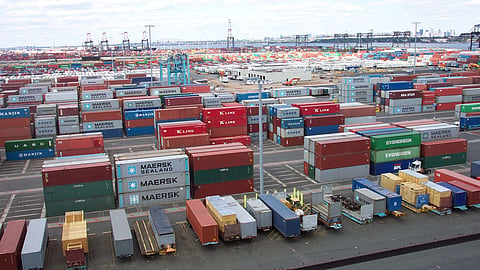Long-term Shipping Rates Stand Strong, For Now: Xeneta
Long-term ocean freight rates climbed yet again in August, edging up 4.1% month-on-month to stand 121.2% higher than this time last year.
The latest global data, crowd-sourced by Oslo-based Xeneta for its Xeneta Shipping Index (XSI®), demonstrates that, despite softening spot rates, uneven demand and ongoing supply chain issues, the world’s leading carriers remain on course for another bumper year of profits.
Over the top?
Xeneta’s benchmarking and market analytics platform, which aggregates data from leading global shippers and freight forwarders, shows that new long-term contracted rates are actually starting to drop on key trading corridors, following on the heels of declining spot prices.
However, due to the fact they’re replacing expiring agreements with considerably lower rates, the average paid by all shippers is still climbing. The question is, for how long?
Patrik Berglund, Xeneta CEO notes: “There’s no doubt the major carriers have had it their way in negotiations for some time.
“The spectacular results they saw in 2021 will no doubt be repeated, and even bettered, this year, as seen by the huge profits that defined many Q2 financial reports. But there is a sense that change is in the air.”
Uncertainty ahead
Berglund continues: “Volumes are dropping and, as expected, long-term rates are beginning to follow the trend set by the spot market.
"When you add in an uncertain macroeconomic outlook, continuing supply chain issues – such as the industrial action we’ve seen occurring, or threatened, in major ports in Germany, UK, and the US – and disruption in China due to the zero-COVID policy, it’s an unpleasant cocktail for the industry to swallow.
“In addition, you also have problems seemingly exacerbated by climate change, with low water levels impacting both power and factory production, as well as hinterland logistics chains.
"How will this challenge the longer-term outlook for carriers that have begun to look ‘bulletproof’? The data will reveal all, so to get the best value in negotiations, stay tuned.”
Uniform trend
For the time being, however, the latest container rates intelligence follows a development path well-trodden over the last couple of years. According to the XSI®, all major indicators across all key routes are still resolutely pointing upwards.
In Europe, the import benchmark grew by 2% month-on-month, an 82.6% increase against August 2021. Exports were even stronger, climbing 7.3% from July.
Exports out of the far East showed a 2.7% rise across August and have now rocketed by 90% this year alone. The curve in imports has not been so precipitous in 2022 (climbing by 40.4% this calendar year), but the last month saw a strong, 4.3% rates rise.
The US is an interesting market, states Berglund, as the shift in volumes from the West Coast to the East simply transfers an issue it was conceived to solve.
Difficult decisions
Berglund explains: “Carriers and shippers looking to avoid West Coast port congestion moved East and, lo and behold, the congestion issues shifted coasts too.
"We now have a situation where schedule reliability is improving in the West, while container rates fall, whereas the opposite is true of the East. However, do stakeholders want to risk moving back West, especially when unresolved union talks may threaten any perceived benefits? It’ll be another case of watch this space.”
As far as August was concerned, both import and export indicators climbed for the region, with imports up 6% (a huge 183.2% year-on-year increase) and exports rising 7.1% (42.5% higher than August 2021).
Read More: Vessel Schedule Reliability Continues Its Upward Trend


